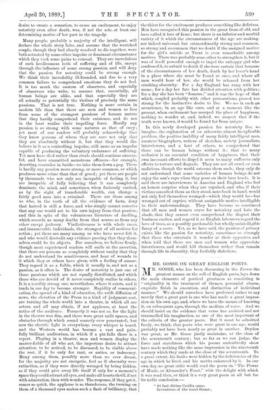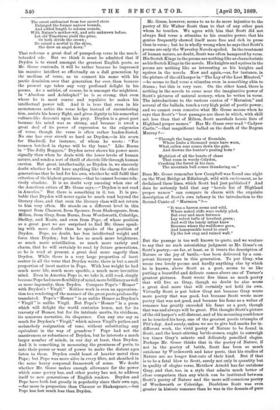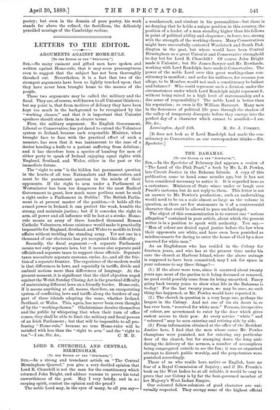MR. GOSSE ON GREAT ENGLISH POETS.
MR. GOSSE, who has been discussing in the Forum the greatest names on the roll of English poets, lays down the main elements of poetical greatness as consisting in "originality in the treatment of themes, perennial charm, exquisite finish in execution, and distinction of individual manner." We should ourselves have preferred rather to say merely that a great poet is one who has made a great impres- sion on his own age, and, where we have the means of knowing it, on subsequent ages, through the medium of verse. And we should insist on the evidence that verse has assisted and not trammelled his imagination, as one of the most important of the criteria of the greater poets. But it must be admitted freely, we think, that poets who were great in one age, would probably not have been nearly so great in another. Dryden was great, as Mr. Gosse justly maintains, at the close of the seventeenth century ; but so far as we can judge, the force and stateliness which his poems undoubtedly show have made nothing like the same impression in the nineteenth century which they made at the close of the seventeenth. To a great extent, his faults were hidden by the deficiencies of the age in which he lived, and his merits enhanced by it. In our own day, no great critic would read the poem on " The Power of Music, or Alexander's Feast," with the delight with which it was read then, or think it a very great poem at all but for its noble conclusion :— "At last divine Cecilia came, Inventress of the vocal frame ; The sweet enthusiast from her sacred store
Enlarged the former narrow bounds, And added length to solemn sounds, With Nature's mother-wit, and arts unknown before.
Let old Timotheus yield the prize, Or both divide the crown ; He raised a mortal to the skies, She drew an angel down."
That redeems a great deal of pumped-up verse in the much- belauded ode. But we think it must be admitted that if Dryden is to stand amongst the greatest English poets, as Mr. Gosse contends, it will be rather because he impressed his massive intellect so effectually on a dull generation by the medium of verse, as to connect his name with his poetic dominion over that generation for ever, than because the present age takes any very profound delight in his poems. As a satirist, of course, he is amongst the mightiest. In " Absolom and Achitophel" he is so strong, that even where he is most coarse and repulsive he makes his intellectual power tell. And it is true that even in his monotonous satire the verse helps instead of encumbering him, assists his heavy flight, and gives dignity to his somewhat vulture-like descents upon his prey. Dryden is a great poet because his mind was so strong, and because it owed a great deal of its power of expression to the exigencies of verse, though the verse is often rather leaden-footed. No one has ever struck so hard as Dryden,—in his scorn for Shadwell, for instance, of whom he wrote : "For treason botched in rhyme will be thy bane." Like Burns in "The Jolly Beggars," Dryden never shows his power more signally than when he deals with the lower levels of human nature, and sends a sort of thrill of electric life through human carrion. But great, intellectually, as Dryden is, we sincerely doubt whether he will have anything like the charm for other generations that he had for his own, whether he will fulfil that criterion of the highest greatness,—that he cannot become rela- tively obsolete. It is no doubt very amusing when one of the American critics of Mr. Gosse says,—" Dryden is not read in America." But there is something in it, too. It is pro- bable that Dryden will never again be much read beyond the literary class, and that even the literary class will not return to him very often. He stands on a different level in this respect from Chaucer, from Spenser, from Shakespeare, from Milton, from Gray, from Burns, from Wordsworth, Coleridge, Shelley, and Keats, and even from Pope, of whose position as a great poet we are surprised to find Mr. Gosse speak- ing with more doubt than he speaks of the position of Dryden. Pope, no doubt, has less intellectual weight and force than Dryden; but he has so much more brightness, so much more scintillation, so much more variety and charm, that he will certainly be read by future generations, as he is read at present, a great deal more eagerly than Dryden. While there is a very large proportion of inert matter in all the verse that Dryden wrote, there is but a small proportion of inert matter in Pope. With less weight he had much more life, much more sparkle, a much more inventive mind. Even in America Pope is, we take it, still read, simply becausePope had more flexibility of mind, more brilliancy as well as more ingenuity, than Dryden. Compare Pope's " Homer " with Dryden's "Virgil." Neither work is even an approxima- tion to a rendering of the manner of the great poets professedly translated. Pope's " Homer " is as unlike Homer as Dryden's " Virgil " is unlike Virgil. But Pope's " Homer " is a poem which will delight the world centuries hence, not for its travesty of Homer, but for its intrinsic merits, its vividness, its sonorous narrative, its eloquence. Can any one say as much for Dryden's "Virgil," which misses Virgil's pathos and melancholy resignation of tone, without substituting any equivalent in the way of grandeur ? Pope had not the massiveness or robustness of Dryden, but he interests a much larger number of minds, in our day at least, than Dryden. And it is something, in measuring the greatness of poets, to note their power or want of power to make the distant ages listen to them. Dryden could boast of heavier metal than Pope ; but Pope was more alive in every fibre, not sheathed in the same heavy corporeal framework of sense. We doubt whether Mr. Gosse makes enough allowance for the power which some poetry has, and other poetry has not, to address itself to new generations of English readers. Dryden and Pope have both lost greatly in popularity since their own age, —far more in proportion than Chaucer or Shakespeare,—but Pope has lost much less than Dryden. Mr. Gosse, however, seems to us to do more injustice to the poetry of Sir Walter Scott than to that of any other poet whom he touches. We agree with him that Scott did not always find verse a stimulus to his creative power, that his genius frequently showed itself more free and rich in prose than in verse ; but he is wholly wrong when he says that Scott's poems are only the Waverley Novels spoiled. In the treatment of human nature, no doubt, Scott was often hampered by verse. His Scotch Kings in the poems are nothing like as characteristic as his Scotch Kings in the novels. His knights and squires in the poems are nothing like as interesting as his knights and squires in the novels. Now and again,—as, for instance, in the picture of the old harper in "The Lay of the Last Minstrel," —he seems to find verse a stimulus even in something akin to drama ; but this is very rare. On the other hand, there is nothing in the novels to come near the imaginative power of Scott's pictures of natural scenery, when he writes in verse. The introductions to the various cantos of " Marmion," and several of the ballads, touch a very high point of poetic power; and we cannot even conceive what Mr. Gosse means when he says that Scott's "best passages are those in which, with skill not less than that of Milton, Scott marshals heroic lists of Highland proper names." Has Mr. Gosse ever read " Cadyow Castle,"—that magnificent ballad on the death of the Regent
Murray P-
" Through the huge oaks of Evendale, Whose limbs a thousand years have worn, What sullen roar comes down the gale, And drowns the hunter's pealing horn ?
Mightiest of all the beasts of chase That roam in woody Calydon, Crashing the forest in his race, The mountain bull comes thundering on."
Does Mr. Gosse remember how Campbell was found one night on the West Bridge at Edinburgh, wild with excitement, as he declaimed these lines, which Scott had just published ? And does he seriously hold that any "heroic list of Highland proper names" can compare in charm with the exquisite description of Scott's own infancy in the introduction to the Second Canto of " Marmion " ?—
"It was a barren scene and wild, Where naked cliffs were rudely piled, But ever and anon between Lay velvet tufts of loveliest green ; And well the lonely infant knew Recesses where the wallflower grew, And honeysuckle loved to crawl Up the low crag and ruined wall."
But the passage is too well known to quote, and we venture to say that no such astonishing judgment as Mr. Gosse's on Scott's poetry,—so far, at least, as it treats the description of Nature or the joy of battle,—has been delivered by a com- petent literary man in this generation. To put Gray, who wrote two lovely poems and hardly anything else by which he is known, above Scott as a poet, seems to us like putting a beautiful and delicate cameo above one of Turner's greatest pictures. Scott wrote five times as much poetry that will live as Gray, though no doubt he also wrote a great deal more that will certainly not hold its own.
Virtually Scott is put below Gray not because Gray wrote more poetry that VMS good, but because Scott wrote more
poetry that was not good, and because his fame as a writer of romance has greatly exceeded his fame as a poet, though that was and always will be great. Pitt thought Scott's picture of the old harper's self-distrust, and of his mounting confidence as he touched his harp, one of the greatest poetic triumphs of Pitt's day. And surely, unless we are to give bad marks for in-
different work, the vivid -poetry of Nature to be found in Scott, and the heart-stirring battle-scenes, ought to outweigh
ten times Gray's minute and delicately pencilled elegies. Perhaps Mr. Gosse thinks that in the poetry of Nature, if not in the poetry of battle, Scott has been so much outshone by Wordsworth and later poets, that his studies of Nature are no longer first-rate of their kind. But if that is to be a fatal blow to Scott, surely not only in quantity but in quality of elegiac verse, Matthew Arnold has far outshone Gray, and that, too, in a style that admits much better of close comparison than any which can be instituted between Scott's poetry of Nature and the more self-conscious poetry of Wordsworth or Coleridge. Doubtless Scott was even greater in historic romance than he was in the domain of pure poetry ; but even in the domain of pure poetry, his work stands far above the refined, the fastidious, the delicately pencilled musings of the Cambridge recluse.




































 Previous page
Previous page